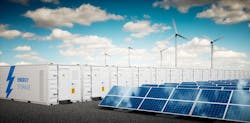The Energy Transition Sky is not Falling: GridBeyond CEO sees Economics good for Environmentalism
Economic crises, the pandemic and the war in Ukraine have changed everything, the harshest critics say. The energy transition is a pipe dream and ESG is dead.
Well, to paraphrase Mark Twain, the reports of that demise are greatly exaggerated, the CEO of data-energy technology firm GridBeyond said in an exclusive interview with EnergyTech.
The war in Ukraine has driven natural gas supply constraints and price hikes in a Europe dependent on Russian natural gas, but if anything that may actually accelerate the move to renewables and oather carbon-free resources rather than inhibit it, GridBeyond CEO and co-founder Michael Phelan predicted.
“The nations that are closer to the cold face of that particular war, this has definitely caused them to reconsider gas as a transitionary fuel (moving from coal power to natural gas as a compromise to lower emissions until renewables gain complete scale),” Phelan said. “They will try to transition at a faster rate to other resources. People in Europe, moreso than the U.S., are kind of questioning whether the transition should go quicker.”
Some might say it’s already on an accelerated timetable, with nations such as the United Kingdom, Germany and France promising to reach Net Zero carbon emissions from energy by 2050 or even earlier. It’s complicated by the fact that, even as they retire all coal-fired power, Germany and France are also moving away from carbon-free nuclear power.
This leaves some big supply gaps if most sectors of the economy are rushing toward electrification.
GridBeyond has just released an in-depth report, “Global Energy Trends 2023: Crisis, Contingencies and Climate Change.” The company talked to various industry respondents and its own experts to offer some reflections on where the world is right now and a rosy picture of where it could be within decades...Hopefully.
“This means we could be on the brink of a historic turning point towards a cleaner and more secure energy future,” Phelan wrote in the foreword of the GridBeyond report. “But it is important to remember that time is ticking, and this decade is our chance to stand up and play our part in creating a net-zero future that ensures supplies are available at a price that is affordable for all consumers.”
Indeed, the coming energy transition may need an over-build of carbon-free resources to achieve these goals at a price acceptable to most. Phelan sees an expansion of installed capacity in utility-scale wind, solar PV, battery storage and also hydrogen as pivotal to offering diversity and the required emissions reduction attributes.
“We’re going to make the case for batteries today, for grid stability” and, eventually, economic efficiency, he added. “Batteries with solar might win today (but) hydrogen will take some time, maybe negative prices. We probably need an overbuild of hydrogen.”
Wind will work in places of tremendous meteorological volatility, such as Texas, middle America and Ireland, Phelan noted. Too much is not enough when it comes to balancing an intermittent resource with enhanced demand as complete electrification of the economy gains momentum.
One resource gaining attention lately for its baseload, zero-carbon power is nuclear energy. U.S. utility Georgia Power is slowly completing the Vogtle Units 3 and 4 reactors expansion, and EDF is working to finish the Sizewell expansion in the UK.
And early adopters are expressing optimism for small modular reactor technologies. Nuclear fusion has made a breakthrough with experiments at the Lawrence Livermore National Lab in California, but reactive nuclear fission still rules the day when it comes to power generation.
Despite this recent promise of a nuclear revival, GridBeyond’s Phelan doesn’t see it making much of an economically beneficial case for companies and energy planners of the future.
“When you look at the overall economics they probably don’t like what they see,” said Phelan, noting the intensely high upfront cost per MWh of proposed new nuclear power plants.. “And it’s not such a great answer in the short run, either. The economics aren’t as good.”
What looks good from current trends is that change has to happen no matter how it’s built out.
“There’s a good deal of thermal power plant retirements in the U.S. and Europe, and it has to happen anyway,” Phelan pointed out. “Look, we have to replace the plants...is it a better business case to build out CHP or solar?”
What looks attractive, from a logistical point of view, is combining renewables and storage with next-gen digital tools such as artificial intelligence, machine learning, demand response and control systems, the GridBeyond CEO added. This is where the rubber meets the road to net zero.
“We’re probably at a transition going from central control and command to much more of a decentralized and information system,” Phelan said. “The supply side is going to be intermittent, so the demand side needs to flexible. . . How do I keep the system going and store energy. We’re seeing this up close in a lot of markets. People are starting to think about what really happens with a supply that is intermittent, and demand is flexible.”
-- -- --
(Rod Walton, senior editor for EnergyTech, is a 15-year veteran of covering the energy industry both as a newspaper and trade journalist. He can be reached at [email protected]).
Follow us on Twitter @EnergyTechNews and @rodwaltonelp and on LinkedIn.
About the Author
Rod Walton, EnergyTech Managing Editor
Managing Editor
For EnergyTech editorial inquiries, please contact Managing Editor Rod Walton at [email protected].
Rod Walton has spent 17 years covering the energy industry as a newspaper and trade journalist. He formerly was energy writer and business editor at the Tulsa World. Later, he spent six years covering the electricity power sector for Pennwell and Clarion Events. He joined Endeavor and EnergyTech in November 2021.
Walton earned his Bachelors degree in journalism from the University of Oklahoma. His career stops include the Moore American, Bartlesville Examiner-Enterprise, Wagoner Tribune and Tulsa World.
EnergyTech is focused on the mission critical and large-scale energy users and their sustainability and resiliency goals. These include the commercial and industrial sectors, as well as the military, universities, data centers and microgrids. The C&I sectors together account for close to 30 percent of greenhouse gas emissions in the U.S.
He was named Managing Editor for Microgrid Knowledge and EnergyTech starting July 1, 2023
Many large-scale energy users such as Fortune 500 companies, and mission-critical users such as military bases, universities, healthcare facilities, public safety and data centers, shifting their energy priorities to reach net-zero carbon goals within the coming decades. These include plans for renewable energy power purchase agreements, but also on-site resiliency projects such as microgrids, combined heat and power, rooftop solar, energy storage, digitalization and building efficiency upgrades.


